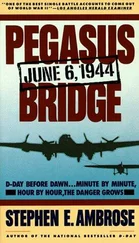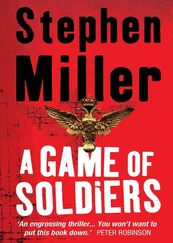Stephen Ambrose - Citizen Soldiers [Condensed]
Здесь есть возможность читать онлайн «Stephen Ambrose - Citizen Soldiers [Condensed]» весь текст электронной книги совершенно бесплатно (целиком полную версию без сокращений). В некоторых случаях можно слушать аудио, скачать через торрент в формате fb2 и присутствует краткое содержание. Жанр: История, на английском языке. Описание произведения, (предисловие) а так же отзывы посетителей доступны на портале библиотеки ЛибКат.
- Название:Citizen Soldiers [Condensed]
- Автор:
- Жанр:
- Год:неизвестен
- ISBN:нет данных
- Рейтинг книги:5 / 5. Голосов: 1
-
Избранное:Добавить в избранное
- Отзывы:
-
Ваша оценка:
- 100
- 1
- 2
- 3
- 4
- 5
Citizen Soldiers [Condensed]: краткое содержание, описание и аннотация
Предлагаем к чтению аннотацию, описание, краткое содержание или предисловие (зависит от того, что написал сам автор книги «Citizen Soldiers [Condensed]»). Если вы не нашли необходимую информацию о книге — напишите в комментариях, мы постараемся отыскать её.
Citizen Soldiers [Condensed] — читать онлайн бесплатно полную книгу (весь текст) целиком
Ниже представлен текст книги, разбитый по страницам. Система сохранения места последней прочитанной страницы, позволяет с удобством читать онлайн бесплатно книгу «Citizen Soldiers [Condensed]», без необходимости каждый раз заново искать на чём Вы остановились. Поставьте закладку, и сможете в любой момент перейти на страницу, на которой закончили чтение.
Интервал:
Закладка:
Eisenhower saw his first slave labour camp on April 13. It was Ohrdruf Nord, near the town of Gotha. He called it the shock of his life. He had never seen such degradation, had never imagined the bestiality man was capable of committing.
"Up to that time I had known about [Nazi crimes] only generally or through secondary sources," he wrote. Like so many men of his age, he was deeply suspicious of wartime propaganda. The reality was far worse than the stories and all but overwhelmed him. "I visited every nook and cranny of the camp because I felt it my duty to be in a position from then on to testify at first hand about these things in case there ever grew up at home the belief or assumption that the stories of Nazi brutality were just propaganda." That night he sent communications to Washington and London, urging the two governments to send newspaper editors, photographers, Congressmen, and members of Parliament to visit the camp and make a record. That was done.
Day after day over the next couple of weeks more camps were discovered. On April 15 Edward R. Murrow went to Buchenwald, just north of Weimar. Like every GI who saw one of the camps, Murrow feared that no one could believe what he saw. He gave a description on his CBS radio program. In his conclusion he said, "I have reported what I saw, but only part of it. For most of it I have no words. If I've offended you by this rather mild account of Buchenwald, I'm not in the least sorry."
Martha Gellhorn of The New York Times visited the main camp at Dachau. Then she flew out on a C-47 carrying liberated POWs to France. She talked to them about Dachau, which they had just seen. "No one will believe us," one soldier said. "We got to talk about it, see? We got to talk about it if anyone believes us or not."
ON APRIL 25, at Torgau on the Elbe River, a lieutenant from First Army, William D. Robinson, met a Red Army soldier. Germany was divided. A celebration ensued. Hundreds of Red Army soldiers found rowboats and rafts and came over to the American side. A factory in Torgau produced harmonicas and accordions, so there was music and dancing. Private Andy Rooney was there for Stars and Stripes. So was combat historian Sergeant Forrest Pogue, interviewing the GIs. They danced with female soldiers-reportedly the best snipers in the Red Army.
ON APRIL 27 the 12th Armoured Division approached Landsberg-am-Lech. Major Winters was one of the first to arrive. "The memory of starved, dazed men," he related, "who dropped their eyes and heads when we looked at them through the chain-link fence, in the same manner that a beaten, mistreated dog would cringe, leaves feelings that cannot be described and will never be forgotten. The impact of seeing those people behind that fence left me saying, only to myself, 'Now I know why I am here!'"
To the south. Third Army was penetrating Czechoslovakia (already assigned to the Russians for occupation) while Seventh Army raced eastwards past Munich and down into Austria (where no boundary lines had yet been set). Eisenhower urged the GIs to get as far into Austria as possible.
There wasn't much resistance.
As individuals, squads, companies, regiments, divisions, corps-as entire armies the Germans were surrendering. The crazies were still fighting, like chickens with their heads cut off, even though Hitler had shot himself on April 30. But most of the shooting was over. The dominant thought in every GI's head was home. On May 6 Don Williams of Stars and Stripes wrote an article that gave them the bad news: "No man or woman, no matter how long he or she has been in service, overseas or in combat, will be released from the Army if his or her services are required in the war against Japan." There would be a point system for demobilization: so many points for length of service, time already spent overseas, combat decorations, and the number of dependent children in the States. Soldiers deemed essential for war duties would either stay on as occupation troops or ship out for the invasion of Japan. "In the meantime," Williams wrote, "don't write home and tell your mother or sweetheart that you'll be home next week or next month. For most of you, it just ain't so."
On May 7 the campaign of the US Army in Northwest Europe came to an end. That morning, at SHAEF headquarters in Reims, German delegates signed the unconditional surrender. The Russians insisted that there be a second signing, in Berlin, which took place on May 8.
Men reacted differently. Sergeant Ewald Becker of Panzer Grenadier Regiment 111 was near his home in Kassel. "We went out onto the streets to surrender. The first vehicle to come was an American jeep and as I raised my hands he waved and grinned at me and continued to drive. Then another jeep with four men. They stopped and gave me chocolate and drove on. Then a German vehicle came with a white flag. I asked him what was going on and he said the war has been over for two hours. I went back to the village and we tapped the first available keg. Within two hours, I can say with confidence, the entire village was drunk."
Sergeant James Pemberton, 103rd Division, by the end of the war had been in combat for 347 days. "The night of May 8, I was looking down from our cabin on the mountain at the Inn River Valley in Austria. It was black. And then the lights in Innsbruck went on. If you have not lived in darkness for months, shielding even a match light deep in a foxhole, you can't imagine the feeling."
Many units had a ceremony of some sort. In the 357th Combat Team, 90th Division, the CO had all the officers assemble on the grassy slopes of a hill, under a flagpole flying the Stars and Stripes. The regimental CO spoke, and the division commander spoke. Lieutenant Colonel Ken Reimers remembered counting the costs. "We had taken some terrible losses-our infantry suffered over 250 per cent casualties. There was not a single company commander present who left England with us."
The 90th Division had been in combat for 308 days-the record in ETO-but other divisions had taken almost as many casualties. The junior officers and NCOs suffered most. Some of America's best young men went down leading their troops in battle. Dutch Schultz paid his officers and NCOs a fine tribute: "Not only were these men superb leaders both in and out of combat, but, more importantly, they took seriously the responsibility of first placing the welfare of their men above their own needs."
THERE is NO typical GI among the millions who served in Northwest Europe, but Bruce Egger surely was representative. He was a mountain man from central Idaho. In October 1944 he arrived in France, and on November 6 he went on the line with G Company, 328th regiment, 26th Division. He served out the war in almost continuous frontline action. He had his close calls, most notably a piece of shrapnel stopped by the New Testament in the breast pocket of his field jacket, but was never wounded. In this he was unusually lucky. Egger rose from private to staff sergeant.
In his memoir of the war Egger spoke for all GIs: "More than four decades have passed since those terrible months when we endured the mud of Lorraine, the bitter cold of the Ardennes, the dank cellars of Saarlutem. We were miserable and cold and exhausted most of the time; we were all scared to death. But we were young and strong then, possessed of the marvellous resilience of youth, and for all the misery and fear and the hating every moment of it the war was a great, if always terrifying, adventure. Not a man among us would want to go through it again, but we are all proud of having been so severely tested and found adequate. The only regret is for those of our friends who never returned."
Epilogue
The GIs and Modern America
AT THE beginning of World War II my father, a small-town doctor in central Illinois, joined the navy. When he shipped out to the Pacific in 1943, my mother, brothers, and I moved to Whitewater, Wisconsin, to live with my grandmother. Consequently, I didn't see many GIs during the war. But in 1946, when Dad left the navy and set up a practice in Whitewater, we had what amounted to a squad of ex-GIs for neighbours. They lived in a boarding house while attending the local college on the GI Bill.
Читать дальшеИнтервал:
Закладка:
Похожие книги на «Citizen Soldiers [Condensed]»
Представляем Вашему вниманию похожие книги на «Citizen Soldiers [Condensed]» списком для выбора. Мы отобрали схожую по названию и смыслу литературу в надежде предоставить читателям больше вариантов отыскать новые, интересные, ещё непрочитанные произведения.
Обсуждение, отзывы о книге «Citizen Soldiers [Condensed]» и просто собственные мнения читателей. Оставьте ваши комментарии, напишите, что Вы думаете о произведении, его смысле или главных героях. Укажите что конкретно понравилось, а что нет, и почему Вы так считаете.
![Stephen Ambrose Citizen Soldiers [Condensed] обложка книги](/books/346737/stephen-ambrose-citizen-soldiers-condensed-cover.webp)








